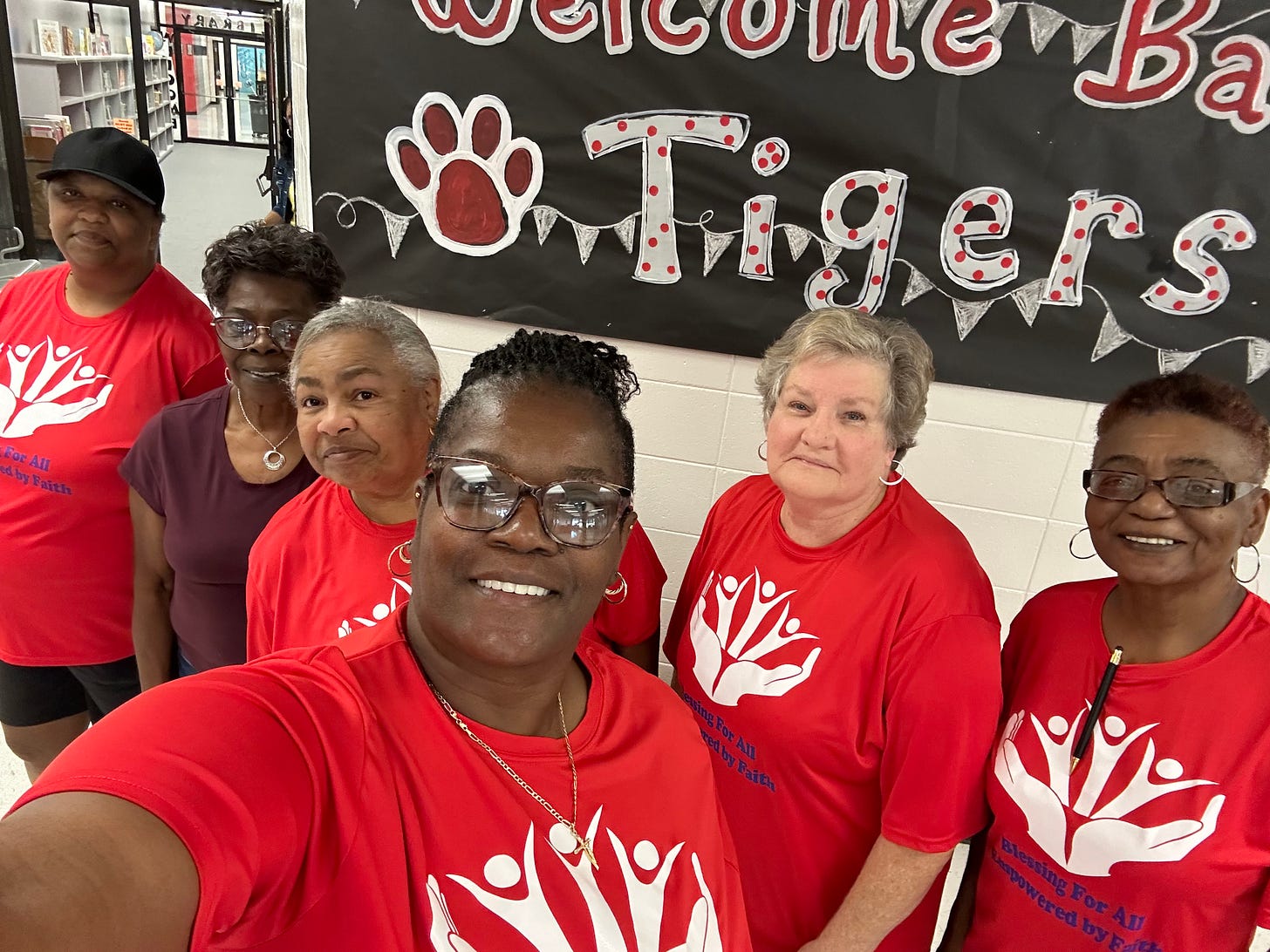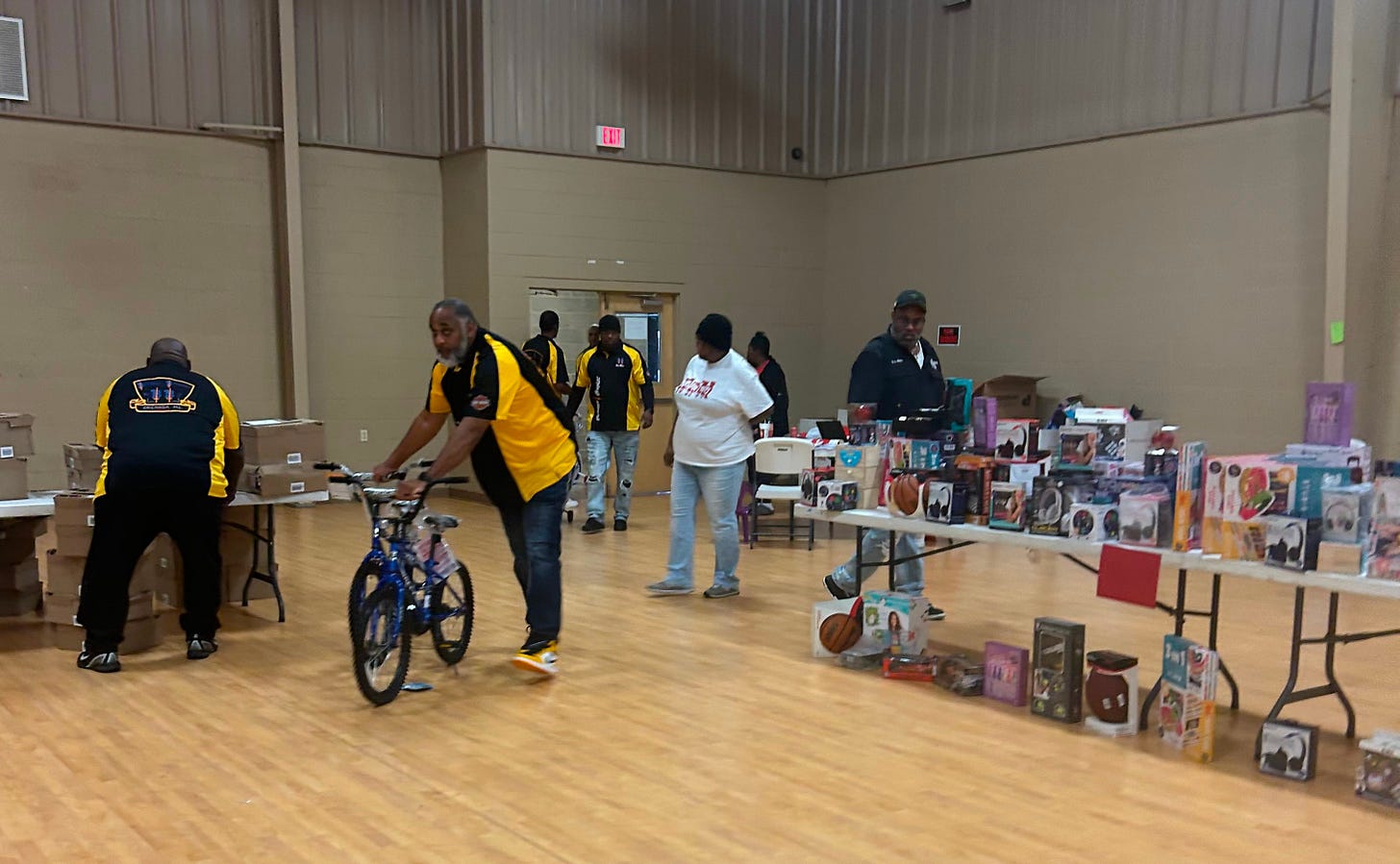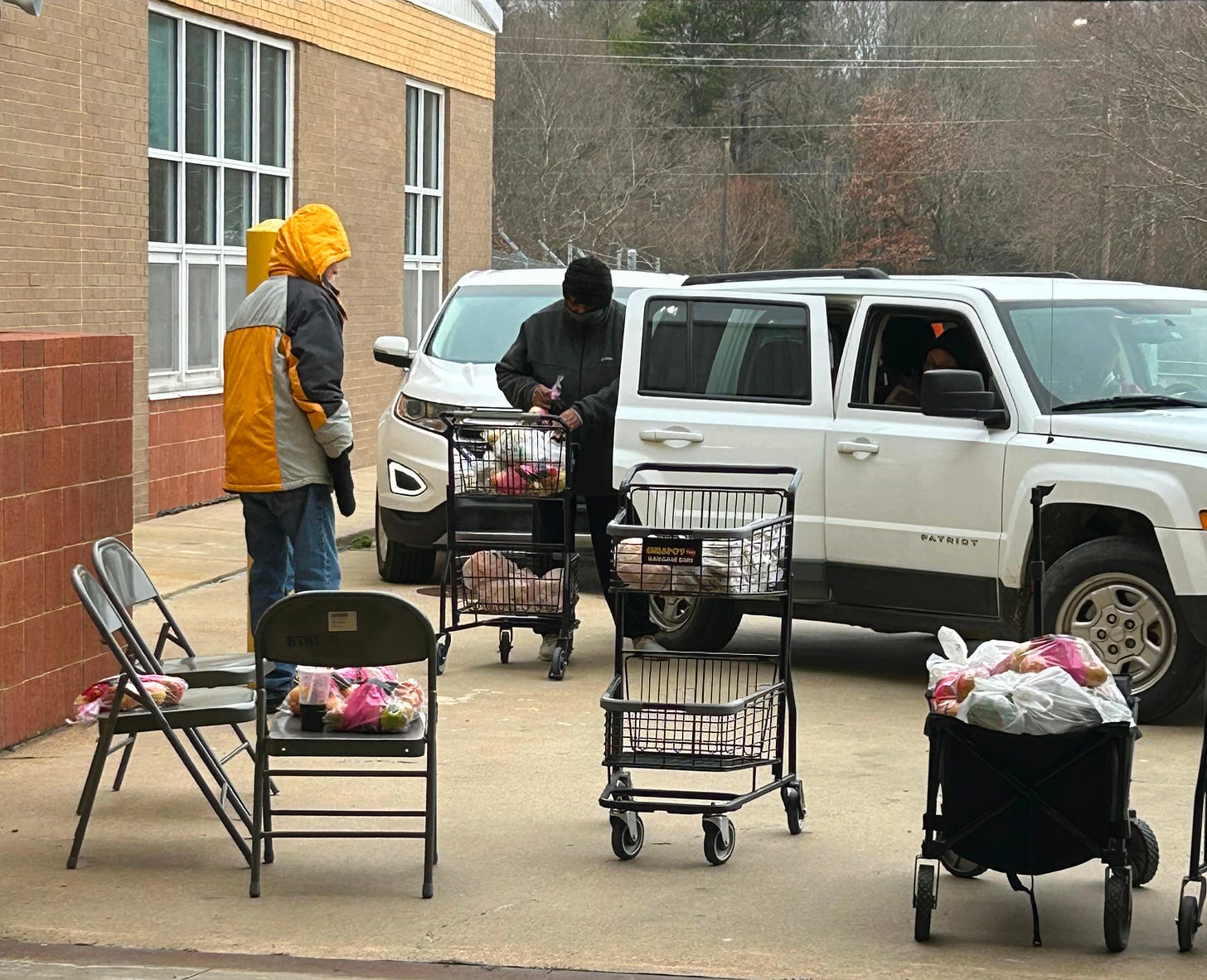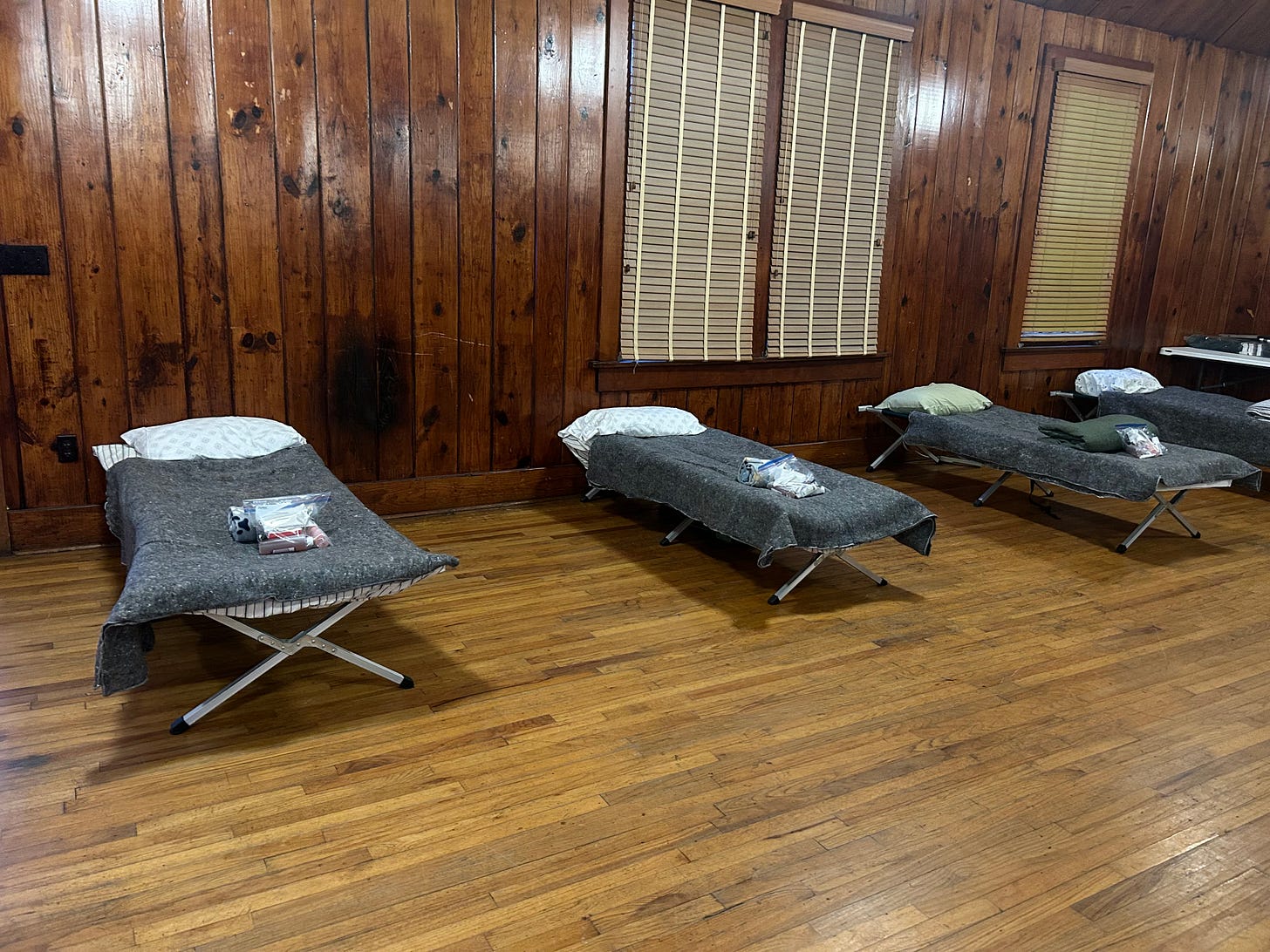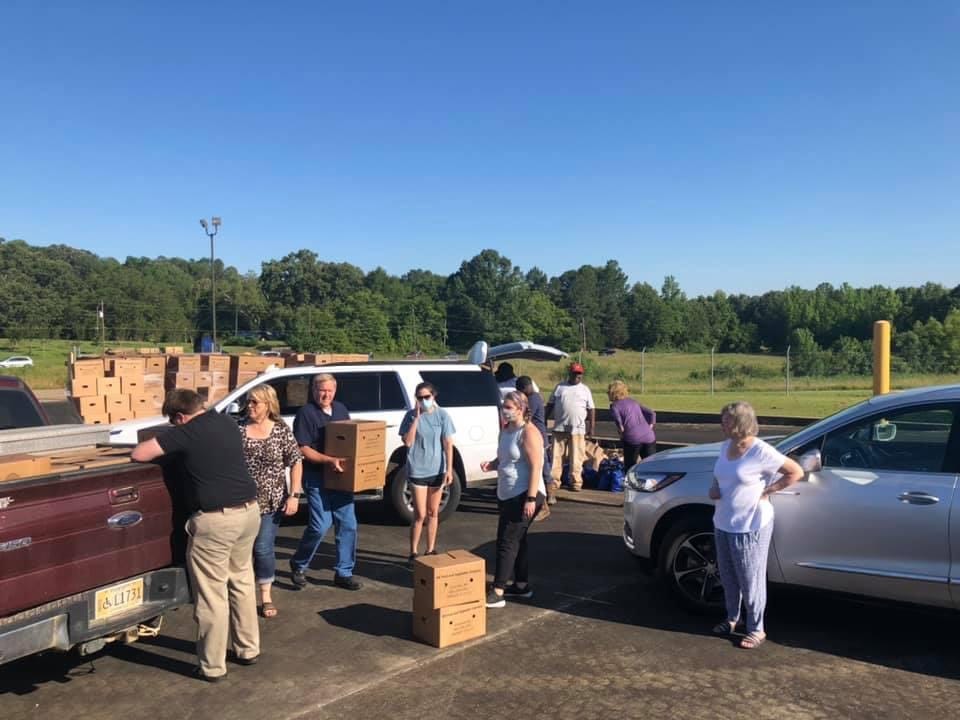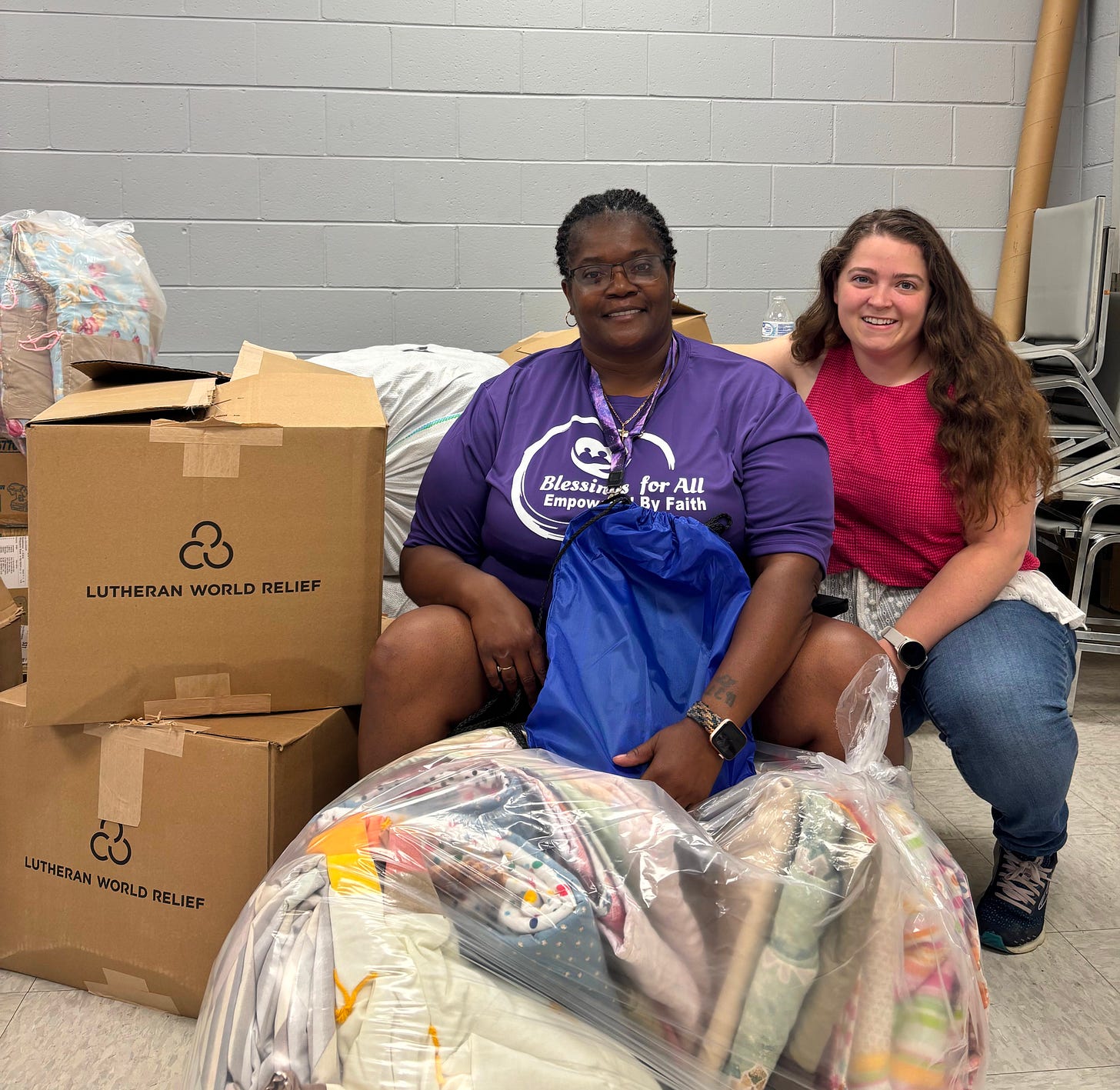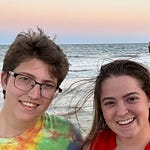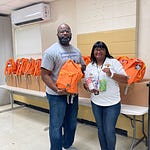We are paddling in support of two organizations that run supplemental feeding programs for kids and families across North Mississippi. This post introduces the second organization, Blessings for All, Empowered by Faith.
Sydney sat down with Calbrina Woods, founder of Blessings, to learn more about her work with the group. From summer meals to holiday toy drives, Calbrina’s story shows how one person’s dedication can grow into a lifeline for so many.
Scroll through the transcript to see pictures!
Transcript
[Sydney]
This is Sydney with River Runs Full, a 2025 Mississippi River journey to raise money for the fight against childhood hunger in North Mississippi. I'm joined today by Ms. Calbrina Woods from Blessings for All, Empowered by Faith.
Thank you again for doing this. I was hoping you could start by just telling me a little bit about yourself and about the organization just in general.
[Calbrina]
My name is Calbrina Woods. I'm originally from California, San Diego. I moved here to Mississippi about 15 years ago.
My dad is from here and he got sick, so I came back to take care of him. And in the midst of taking care of him, six months after I moved here, he died of diabetes and kidney failure. But the kids were already in school.
I have two girls. They were both already in school. I noticed that it was just some programs around here that I was used to in the city that helped me as a single parent that wasn't here in Mississippi, in the area that we're in.
So I started implementing those programs and I noticed the youth didn't have much to do here and my kids were youth. So that's when I started all the programs that we have now. We titled it Blessings for All, Empowered by Faith, and it's just that.
We help old, we help young, we help people that are in poverty. We help everybody that we can with the resources that we receive donated. That's how we got started.
There was no summer feeding program here. My mom and I used to just pack lunches up in brown sacks with a fruit and a juice and we used to sit outside in the housing projects. I didn't have a whole lot of money, so we would only do it maybe twice a week for the whole summer, things like that.
So that's how we got started doing those things. There wasn’t a Easter program. There was a lot missing that I was used to in the city.
So that's how we got started.
[Calbrina]
I definitely understand that. I grew up in Winona, too, with a single mom. I live in Chicago now and it is night and day, the resources that they have here.
So I think it's wonderful what you're bringing to the community. The organization has grown so much. You do so many different things now.
But can you tell me a little bit about what the day-to-day looks like and also more detail about kind of your work with the kids and the summer feeding, what it looks like now?
[Sydney]
We started outside of a pickup truck, handing out sack lunches to now… then we had probably about 18 kids, probably 18 to 20 kids … But now, fast forwarding approximately 14 years later, now we have an average of about 31 children.
It's so neat to see them start the program at five and six. And now I got football players and their voices changing and they're getting peach fuzz. And now they care what girls think.
And I'm like, OK, this summer has really been a different summer for me because they have all grown up. But anyway, for our summer feeding program, we feed the kids the first day. Like if they get out of school on a Thursday, that Monday we start the program because it's statistically proven that some meals, the meals they receive at school may be the only good meal that they get out of the whole day.
We didn't want to wait two weeks or just feed for one week. We feed for the entire summer. So we feed all the way up until two days before school starts so that they don't go lacking without anything.
They get nutritious food, they get the basic needs, the bread, the meat, the fruit, the drink. And it's really cool. But not only do we feed, we also educate.
So we have the forestry come in and teach about forest fires and camping safely, fishing safely, make sure they have license to fish. Most of them don't know how to fish.
And they come in, the Red Cross come in and teach about fire safety as well as tornado safety, because we have become tornado alley. We teach about tornado safety. We teach about fire safety.
We have the police officers that come in and tell them how to ride their bikes, the proper way to ride their bikes with traffic, how if there's something going wrong, don't be afraid of them, report things and stay away from gun safety. They come in and speak. We have junior auxiliary that come in. They do arts and crafts with them.
So we do a little bit of partnership with quite a bit of people because it's not my program, it's our community program. I pull a lot of different people in just to come and talk.
We're creating memories. A lot of things that we do, the kids have never done before. We take them swimming to Grenada. They go swimming to Grenada every other week, depending on funding.
Most of the time we usually make it because God makes a way. And then when we leave the pool, we have sack lunches. My mom is the cook, so we don't pay anybody. Nobody gets paid, not even me. Nobody gets paid.
So my mom is the cook and she makes sack lunches for us when we take the field trip.
At the beginning, when I started this, the kids would not pray. Now I can say somebody pray and they pray. So I know the programs that we are implementing, they're amazing.
The kids are really learning. That's my biggest thing that we got.
But we do other things. We partner with the United States Marine Toys for Tots and we bring Christmas. I believe last year we serviced over 3,000 children. Now with that program, it's just not Montgomery County. It's Montgomery County, Carroll County, Grenada County, Leflore County and Leflore County. So those are all the kids in it. They just have to register.
And I do mine's different. I know you're up there where you are. They probably just pack the bags and then the people come through and they get their bags.
Yeah, no, not me. I'm a little extra because I want the parents to feel like even though it's hard on me right now, but I want to still be able to give my child something and just let my child. I don't know if they know that it came from me.
What I do is I actually do a Santa shop. There's no children allowed at all. So we set up the tables according to the age, and the parents actually come in with a shopper and elf and they walk to the tables and they pick up the toys that their kids would play with.
All the toys are brand new. Nothing used. But we do have a used section that if they feel like they want something out of the used section, they can get that.
They're not allowed to get any amount of toys. Each child gets two really good toys and then they get two stockings. And they always get a book. Everybody has to get a book and that's their Christmas.
I like to think that the parents could go home and wrap them up and put them up under the tree and make it think that it came from them and not from toys for time.
[Sydney]
I love.
[Calbrina]
Yeah. So that's one other program.
And then, of course, the food pantry. It started out with the veterans because I'm FRG. I'm the Family Readiness Coordinator for the unit here, the field artillery unit here. And I noticed that some of our soldiers, more and more, are asking for additional assistance with food and toiletries and everything.
So I started a pantry for the veterans. So then I talked to another lady that's at Mississippi Food Network, which partners with Feed America. We got with them and they was like, “hey, you guys want to open a pantry? We'll help you.” So now the only thing about the pantry, when they assist us: we have to open it up to everyone, which is no problem. So that's how we became with the pantry.
And we help generally about 150 households a month with that. And they get like between 12 and 13 different shelf stable items. And then they'll get a piece of meat and a fruit if we have it. We'll give them a fruit as well. And that program has done wonders for the area, too.
We also work with DHS. So if a family goes to there or church and get a reference sheet for additional assistance, they could come any time and we'll open it up to them, too, as well.
We opened the first ever warming shelter in Montgomery County. It was really nice and it was really forthcoming. We actually took people in from other counties because it had never been done. We had people there for six days, I believe. I believe it was six days.
They taught us how to serve them better. So when they left, they had three days worth of food and they had clean towels, socks, toiletries, all kind of things. And they were allowed to take their blankets and their pillows and everything.
But while they were there, they got haircuts. They was able to take showers. We had an RN that come and just check on them, do a general check on them. And some was missing and said they needed medicine. We found doctors that would take them in just for that one visit. I think only one person took advantage of that.
When they all left, they got mentors to follow them for a whole year. So within that year, everybody out of the program ended up with a job, but two people, which was great. But yeah, we do quite a bit.
And sometimes talking about it is, “dang, you do a lot.”
[Sydney]
You do so much. I didn't even know that there were that many different arms of the program. That's amazing. And I can hear just like how much you love the community from what you’re sharing.
[Calbrina]
Oh my gosh, I love it.
Yeah, I believe this is my calling that God has given me. He makes a way to provide for me so that I can have that extra time to take care of his people. I always think about when I was younger and I would struggle and I'd get on my knees at night and I'd be like, OK, Lord, we just ate our last little food.
I got a little bit to probably make something, but I don't know if I'm going to be able to make too much or I'm going to be lacking the next couple of days. Lord, please help me. And then the next morning, somebody say, “hey, they're giving out food over here or hey, they're doing this.”
And that's the way I like to think of it, that there's a mother somewhere on her knees the night before telling God, hey, it's tough. I don't want to do something that I don't want to do to make sure my ends meet. Can you please help me?
And that's where we come in. I tell my volunteers that all the time, somebody is already battling something. We don't know what it took for them to actually get in this line and stand here for 45 minutes.
We don't know. So make sure when they come, we greet them with nothing but respect and a smile. That makes a big difference, a big difference.
If someone presents us a challenge or if I see a need that is there, we'll go out and we'll try to figure out how we could help fulfill that need. And it doesn't have to be us that spearhead it. We'll join in with another organization just so that it can get done.
It's about serving the people. It's not about us at all. Our name could be left out of it. You just let us put our hands on it. And I always tell the volunteers that, too: if you're not loving what you're doing, then it might be time for you to take a break because this is not a job. It's fueled off love.
That's how you get your energy to continue. That's how we get the energy to stand outside and it's 90 degrees. That's how we get the energy to keep warm when it's only 10 degrees outside.
No matter what goes on, that line still moves. We have never had to cancel a monthly distribution, even when I'm deployed. The babies still get it done.
And I'm way across the country still telling them, you know, and they're like, “OK, we got it.” I'm like, “OK.” So, yeah, we love what we do.
I'll stop talking because I would talk to your ear off.
[Sydney]
I am enjoying that. I am enjoying learning from you.
Yeah, I guess let me tell a specific story or memory. Tell me about one of your favorite interactions with a family, one of the kids that you serve.
[Calbrina]
OK, I will do… I have so many, so I was like, “which one am I going to choose?”
[Sydney]
You can tell two or three if you want to.
[Calbrina]
So the one that I would use would actually be last year with Toys for Tots: It's becoming more popular that grandmothers are raising their children. It's becoming more (and generally supposed to be the mother or the father that signs the kids up.) But I've opened it up and let grandparents sign up. And this one grandma, she comes up and she signed up through the DHS because she just got her – won the kids for custody from the state because the mom lost them.
So she went and tried to get the kids - She went and got the kids – and she just won it. And now she was getting herself together.
And she's 71 years old.
[Sydney]
Oh, my goodness.
[Calbrina]
71.
And these kids are stair steppers. I believe they were like four. The oldest was seven and it was four of them.
And the oldest was seven and the other one was like four. And I remember her coming. She had the two youngest one in a shopping basket - not a wagon, a shopping basket.
And one of my volunteers says and she says, “you come by somebody with a shopping basket.” I said “a shopping basket?”. And I said “they might be trying to go to the food pantry.”
And she was like, “no, she said she's supposed to pick up some toys.” And I'm like, “oh, wow.” So I said, “let me find her” because I don't want – everybody else was in line, and I didn't want her to feel different or out of place. And I found her file and I pulled her and I said, “the kids can't come in.”
And there's these little bitty teeter teeters. And I said, but I said, “I'll get a volunteer to watch the children.” They watched the kids. I declare, I declare Sydney: we got inside of there. When she saw all those toys, she just started crying. And she said, “do you mind if I just sit down for a minute?” And I said, “sit, take your time.”
She sat down, and she sat in that chair, and she cried for at least five minutes. And she said, “I've been holding it in for so long.” She said, “it's not because of what y'all doing from now.”
She said, “I didn't want to do it. But the kids is always there.” And I understood - she didn't have to tell me that she didn't want to cry in front of the kids. She didn't have to tell me. I knew that because that's the same place that I had been in before. So I gave her that time and she took that time and she got those kids toys. We put them in black garbage bags. One of the volunteers gave her a ride home. And then the young man (cause we have men that follow) he pushed her basket back to her home so that she can still get around.
And she said that the mom was out. She said, “I don't know where she is, what she does.” She said she didn't get the food stamps, but they're getting ready to transfer the food stamps to her.
So when I got back there, everybody was like, “what's wrong?” Cause then I cried, but I didn't want to cry in front of her. So then I cried and then I was telling the story and everybody just started pulling money out of their pockets. Everybody just started pulling money out of their pockets.
So not only did we give her a monetary donation - I took it back to her later. We gave her household goods to last her probably two months. We gave her food.
We bought a wagon for her to pull the kids instead of doing the shopping cart. We bought one of those collapsible wagons, and they had food and the little boy was like, “this is for us?” And I'm like, “yeah,” cause what I did, I went to the pantry and brought back a case of fish, a case of chicken, things like that.
And every month now I call her and I say, “you okay?” And she says, “yes, baby, I'm okay.” And every now and then when I go to the grocery store, I might pick up a few things and I'll just drop it off at her house, so that builds a foundation for her to call me if she needs me.
And it also gave me a family because my kids are grown and gone from home, but I got a family across the way that got little bitty ole kids that I can help and watch grow now, and that became my family. And she's so good. And she's so grateful.
Sometimes when you give to people like that, they become a crutch and depending on you and always call and ask for something. She has never, ever called me and asked me for anything. I always have to call her. Yeah.
So yeah. And I'm trying not to cry because I promise: that woman right there? She, me, all over.
And it's happening so much more that these grandparents - already on one income - out here trying to raise the kids to keep them out of the system. And it's not right, but she didn't give up. She didn't let them take them kids.
[Sydney]
It's more than building community. It is building family.
[Calbrina]
It is. That is my family. That is my family. That is my family. Yes, for sure.
[Sydney]
Especially knowing that you didn't grow up in Mississippi, that you're a transplant, sometimes (I'm sure you've come across this) people can have all sorts of ideas and expectations about what it's like here or what it's like to be poor here, but you've come in with open arms and made it a better place and become part of the community.
I can tell you love this community. So tell me: try and distill it down into what you love about this part of the world, and then anything that you want to leave the listeners with, like your final thing that you want to share.
[Calbrina]
I love Mississippi. It's quite… You know what it is living there. The people are grateful and I have a wealth of experience in serving the community.
I still have years to go. I still have projects to go, but that's what I love so much about Mississippi is that they give you that chance to grow. 90% of the people are very grateful for everything that we do.
Everybody's more loving on each other, even though there's always going to be violence wherever you go. But the people here are more forthcoming of building relationships here. I like that togetherness:
The football games, we pack out a stadium just for a high school game. So I like that part of it.
And the thing that I probably would leave you with is: no matter the age, no matter where you come from, no matter who you are, we're all put together on this earth to help each other. We all offer something to somebody, but there's always a spot for everybody.
[Sydney]
Amen to that. As you know, we're kayaking the Mississippi River to fundraise in support of the amazing work you're doing. How will this money help you expand your mission?
What's the wish list, so to speak?
[Calbrina]
We're praying now and that God would finance us to get a building because right now we're working out of the National Guard and we have been for years. They're talking about that someone else might come in and buy it. We're just hopeful for a lot of things right now.
So I know God is going to make a way because we wouldn't last this long if it wasn't his purpose and his will. So that's what I always tell the girls. But I really appreciate you giving me a call today to be able to tell my story.
The biggest thing is just not my stories, our stories, the community's story. And I'm honored to be able to tell it and let it reach different levels and different areas to just let people know in Mississippi, we love and we love hard and we love everyone.
[Sydney]
That was Calbrina Woods, director of Blessings for All Empowered by Faith. You can donate to the building fund by visiting our website at RiverRunsFull.com or our GoFundMe. Other donations will serve to feed the children.
Calbrina's work directly serves the youth of Montgomery County, and every dollar we can send her way is a blessing. Join us by donating today at RiverRunsFull.com.

